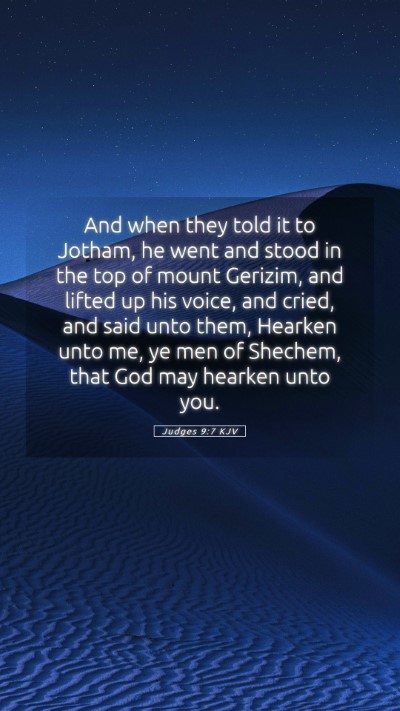Bible Verse Commentary: Judges 9:7
Verse: "And when they told it to Jotham, he went and stood in the top of mount Gerizim, and lifted up his voice, and cried, and said unto them, Hearken unto me, ye men of Shechem; that God may hearken unto you." (Judges 9:7, KJV)
Understanding the Context
Judges 9 narrates a pivotal moment in Israel's history following the period of the judges. It details the events surrounding Abimelech's rise to power and the violent conflict that ensued. The verse itself marks a critical turn where Jotham, the only surviving son of Gideon, addresses the citizens of Shechem after they have chosen Abimelech as their king.
Meaning and Significance
This passage emphasizes several key themes:
- The Role of Leadership: Jotham’s speech serves not only as a warning but also as a reminder of the qualities essential in true leaders. Through this verse, we see the significance of moral integrity in leadership.
- Divine Sovereignty: Jotham’s declaration that “God may hearken unto you” illustrates the belief in divine observation and justice, emphasizing that God pays attention to human actions and motives.
- Symbolism of Mount Gerizim: The location of Mount Gerizim is significant as it is historically associated with blessings in Deuteronomy (Deut. 11:29). Jotham’s choice to speak from here underscores the importance of obedience to God's commands and the blessings that follow.
Commentary Insights
Matthew Henry:
Matthew Henry emphasizes that Jotham's action of standing up to speak is a demonstration of courage in the face of adversity. He interprets Jotham’s message as a parable, symbolizing the choice between righteous leaders—represented by the olive tree, the fig tree, and the vine—and the self-serving nature of Abimelech.
Albert Barnes:
Barnes highlights the literal and figurative interpretations of Jotham’s cry. His call to the people signifies a rallying cry to return to faithfulness and integrity. Jotham’s warning is reflective of the disastrous consequences that follow poor leadership and the rejection of God's appointed leaders.
Adam Clarke:
Clarke connects this episode to the larger theme of Israel’s cyclical disobedience and turbulence within leadership roles. He points out that Jotham's address not only serves as a warning but as an indication of the hope for righteousness that remains for those who heed God's voice.
Application in Modern Context
For today’s readers, Judges 9:7 invites reflection on:
- Discernment in Leadership: Assess the leaders in your community, church, and society. Are they exemplifying the qualities that align with God’s standards?
- Listening to Warnings: Jotham’s plea serves as a reminder to listen to those who offer Godly counsel, especially in times of moral confusion.
- Consequences of Choices: Consider the repercussions of collective decisions made without divine guidance. Jotham's cry is a call to align ourselves with God's will.
Related Bible Cross References
- Deuteronomy 11:29: References the blessings pronounced on Mount Gerizim.
- Judges 8:30-31: Discusses Gideon’s legacy and the focus on leadership.
- Proverbs 29:2: Highlights the importance of just leadership.
In conclusion, Judges 9:7 is not only a historical recount but also a spiritual awakening that confronts contemporary believers to evaluate their leaders, their responses to God, and the importance of righteous authority. This verse enshrines profound Bible verse meanings, expanding our Bible verse interpretations and enhances Bible verse understanding.


